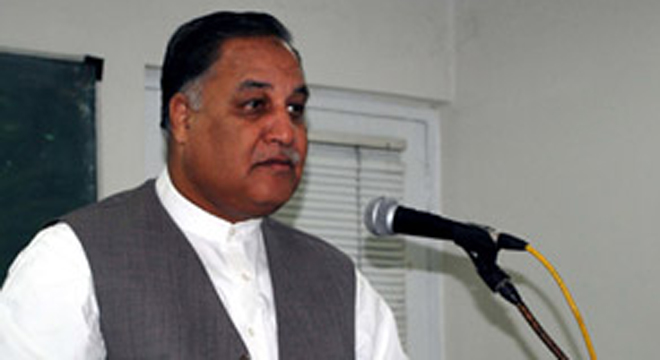by Kim Barker and Habiba Nosheen, ProPublica
One of the men accused of helping orchestrate a plot by Pakistan’s main spy agency to influence U.S. policy on Kashmir died today, providing the latest twist in an already bizarre case.
Pakistani-American Zaheer Ahmad, 63, suffered a stroke on Sept. 28, said Azmat Ullah Qureshi, a spokesman for Shifa International Hospital in Islamabad, the hospital Ahmad founded. Ahmad was taken to Shifa, where he remained in a coma until dying this morning, Qureshi said.
Shifa hospital put up a statement today on its webpage: “This is a moment of great sorrow and grief,” the hospital announced. “We are deeply saddened to announce that Founder, President and Chief Executive Officer of Shifa International Hospital, Islamabad Dr. Zaheer Ahmad has left for his heavenly abode today, leaving thousands of his bereaved friends and colleagues behind.”
On Monday, ProPublica published a story looking into the case against Ahmad and his alleged accomplice, Syed Ghulam Nabi Fai, an American citizen from the Indian side of Kashmir. The Justice Department announced the case against Fai and Ahmad on July 19. Fai was arrested while driving his wife to the subway and is currently under house arrest in Fairfax, Va. Ahmad was in Pakistan.
Fai and Ahmad were accused of helping funnel more than $4 million from Pakistan’s main spy agency, the Inter-Services Intelligence Directorate, or ISI, to the U.S. to influence America’s position on Kashmir, the disputed territory claimed by Pakistan and India. Some of the money allegedly was donated to U.S. politicians, and Fai was able to win some influence on Capitol Hill, meeting with top officials.
Ahmad was accused of recruiting at least 13 “straw donors,” mainly Pakistani-American doctors and professionals, to help steer money into Fai’s nonprofit, the Kashmiri American Council. Some of the donors gave hundreds of thousands of dollars to Fai and were mostly reimbursed by Ahmad, who got his money from the ISI, the FBI affidavit said.
It’s not clear what Ahmad’s death will mean for the case. Ahmad had continued to work at Shifa and appear in public after the charges were filed, and the Pakistan government had given no indication that he would be extradited. Pakistani officials denied that Fai and Ahmad worked for the ISI.
Dean Boyd, a spokesman for the U.S. Justice Department, said American officials had seen reports of Ahmad’s death, but referred questions about it to the government of Pakistan.
“At this time I’m not in a position to independently confirm those reports,” Boyd said. He declined to speculate on how Ahmad’s death could affect the Justice Department’s prosecution.
Ahmad and Fai were charged with failing to register as foreign agents with the Justice Department, punishable by up to five years in prison. Fai was also charged with making false statements. A grand jury is still hearing evidence in the case, and an indictment could include other charges.
The case was filed against the two men as the relationship between Pakistan and the U.S. came under increased strain. Some supporters of Fai and Ahmad have claimed that the men were victims of that strain.
Reporting by ProPublica indicates the FBI’s investigation ranged well beyond the allegations in the affidavit. Before announcing charges against Fai and Ahmad, FBI agents fanned out across the United States, questioning about 18 people linked to Ahmad, said Shafqat Chaudhary, who serves on the boards of Shifa and Ahmad’s U.S. charity, the Society for International Help.
Gul Chughtai, a Pakistani-American physicist who clashed with Ahmad at Shifa, said an FBI agent asked him about a trip Ahmad allegedly made to Afghanistan with an eccentric Pakistani nuclear scientist, Sultan Bashiruddin Mahmood, to meet Osama bin Laden. Mahmood had been put under house arrest by the Pakistani government for another meeting with bin Laden shortly before the attacks of Sept. 11, 2001.
In a phone interview with ProPublica on Sept. 2, Ahmad, who spent 13 years in the U.S. before returning home in 1985 to start Shifa, said he couldn’t discuss the case against him.
“People know me in America, and people know me in Pakistan,” he said. “My work is open. Until this case is finished, I can’t discuss this. And it could be dangerous for you, too.”
He also said he didn’t think the case would hurt his job. “I am a social worker and am working day and night,” he said. “That is my bread and butter. I don’t know what’s going to happen. But it won’t affect the work that I am doing in Pakistan.”









